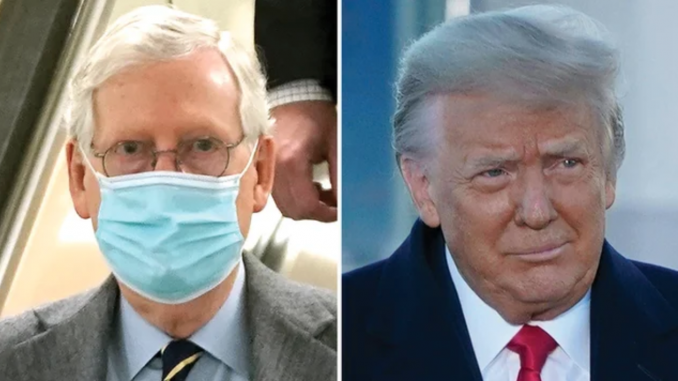
In the battle for the future of the Republican Party, there are two competing power centers: one is former President Trump, the other Senate Minority Leader Mitch McConnell (R-Ky.).
McConnell has been asserting himself in recent days, most notably by blasting the theories put forward by Rep. Marjorie Taylor Greene (R-Ga.), a QAnon sympathizer and Trump ally.
McConnell has also stepped in to support Rep. Liz Cheney (R-Wyo.), the third-ranking Republican in the House, who was one of 10 members of her party to vote to impeach Trump in the wake of the Jan. 6 Capitol insurrection.
In the aftermath of that event, McConnell said that Trump had “provoked” the crowd and that “the mob was fed lies.”
But the issue is not purely about Greene, Cheney or even the events of Jan. 6.
McConnell clearly has come to see Trump — and Trumpism — as a liability for his party in the future. Comparisons are drawn with the rise of the Tea Party roughly a decade ago — a development which on one hand gave the GOP a new infusion of energy and on the other produced eccentric nominees who lost winnable Senate races.
McConnell and the rest of the GOP establishment are desperate not to repeat that scenario. The fact that a number of corporate donors have said they will pause their giving to GOP candidates who refused to accept the result of the 2020 presidential election adds fuel to their fire.
But Trump loyalists see things entirely differently.
They argue that the establishment has a greatly inflated sense of its own popularity beyond the Beltway. They note that, among the party’s activist base, Trump remains the most popular Republican in the nation by far.
In an Economist/YouGov poll conducted last week, Trump was viewed favorably by 81 percent of Republican voters, even though only 41 percent of all registered voters saw him the same way.
McConnell’s favorability rating among GOP voters was just 27 percent.
Some of the disparity can be explained because 17 percent of Republicans expressed no opinion of McConnell, compared to just 1 percent for Trump. But that’s not the full story. A striking 57 percent of Republicans held an unfavorable view of McConnell. For Trump, that figure was 18 percent.
“You can’t overestimate how much disdain Republican voters have for Republican leadership in Washington,” said one former Trump campaign adviser, who requested anonymity to speak candidly.
This person added that Trump and McConnell “are competing power centers inside the Beltway GOP, but outside of D.C. it’s clearly Trump’s party and it’s really not even close.”
Still, there are plenty of people in the party who welcome McConnell’s intervention, believing that someone of his heft is needed to stop the GOP from careening off the rails.
The ongoing controversy over Greene is the clearest example. Greene has expressed support for calls for Speaker Nancy Pelosi (D-Calif.) to be assassinated and has endorsed the fiction that some prominent school shootings were “false flag” operations.
Greene was endorsed by Trump, uses photos of her with him in fundraising appeals and, on Saturday, tweeted that she had “a GREAT call” with the former president and was “so grateful for his support.”
McConnell, in a statement first released to The Hill on Monday, lashed out at some of Greene’s ideas, albeit without naming her.
“Looney lies and conspiracy theories are cancer for the Republican Party and for our country,” he said.
One former Republican congressman said he believed McConnell was right to take a stand, not only against Trump but against Trumpism.
“What’s happening here is that McConnell’s instincts are to draw a sharper contrast with President Trump, and he’s right about that. He’s absolutely right,” the former congressman said.
But, he added ruefully, “why the rest of the party is not following is a bit surprising to me.”
McConnell has been careful not to get too far out ahead of his Senate colleagues in his public statements, but it was reported in mid-January — without denial from the minority leader’s camp — that he was open to convicting Trump at the upcoming impeachment trial.
Any momentum for that within the GOP has ebbed away. When Sen. Rand Paul (R-Ky.) sought to have the Senate trial declared unconstitutional last week, the vast majority of GOP members — including McConnell — backed him.
“I can’t understand why embracing a twice-impeached former president is a good thing,” the former GOP congressman lamented.
Both sides would seemingly prefer to avoid an outright civil war in the party.
Trump has been silenced in part because of his being kicked off several social media platforms. But his allies say they could envision him relishing a fight with the GOP establishment, including backing primary challengers to incumbent senators.
There is a realization, however, that those kinds of struggles are likely to benefit the Democrats more than anyone else.
“We are bogged down in personality clashes,” said Barry Bennett, who served as a senior adviser on Trump’s 2016 campaign. “In the end, Mitch McConnell had as much to do with Trump’s achievements — certainly, the legislative successes and the judges — as Trump did. It is better to circle the wagons and start shooting outside.”
But given the stakes, and the personalities involved, an internal GOP ceasefire looks distant for now.
Via The Hill
